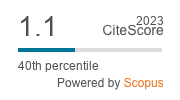Malaysian Journal of Mathematical Sciences, March 2025, Vol. 19, No. 1
Investigating Items as Predictors for Application of Personalized Mathematics Learning Instrument among Pre-University Students in the Maldives: An Exploratory Factor Analysis
Mohamed, M., Ayub, A. F. M., Yasin, M., Nawi, N. R. C., and Salim, N. R.
Corresponding Email: [email protected]
Received date: 28 April 2024
Accepted date: 27 August 2024
Abstract:
Personalized Mathematics Learning (PML) holds significant importance in mathematics education in the global learning environment. Accordingly, PML in any institution allows tailored instruction catering to students' individual learning needs and preferences. The study aims to investigate the items as predictors for PML instrument validation for pre-university students in Maldives through Exploratory Factor Analysis (EFA). A total of $120$ pre-university students were randomly chosen for data collection at the Maldives National University using a structured questionnaire. The instrument consists of $52$ items on the five-point Likert scale with eleven constructs of PML. EFA was conducted for each construct using IBM SPSS version $25.0$. The results discovered one dimension in all the constructs; 11 items with factor loading $< 0.60$ were eliminated. $41$ items determined a factor loading $> 0.60$ were retained to measure the PML construct. Bartlett's Test of Sphericity was $< 0.05$ for all the constructs, yielding a significant $p-$value $< 0.05$. Kaiser--Meyer--Olkin Measure of Sampling Adequacy was $> 0.5$ for all the constructs, signifying a sufficient sample size. The results indicate a greater internal consistency for individual and overall constructs. The instrument proved valid and reliable for predicting the application of the PML construct in mathematics education in the Maldives.
Keywords: personalized learning; instrument; reliability; exploratory factor analysis; Maldives National University









